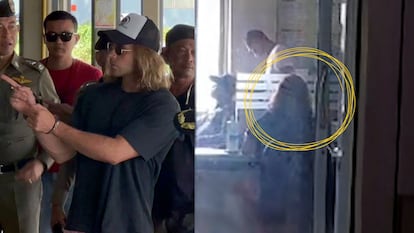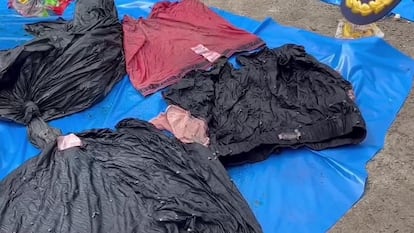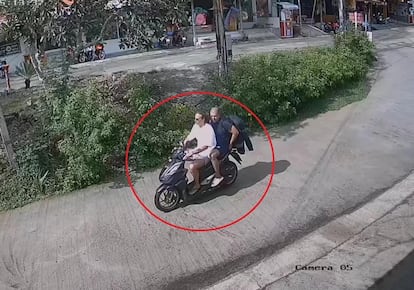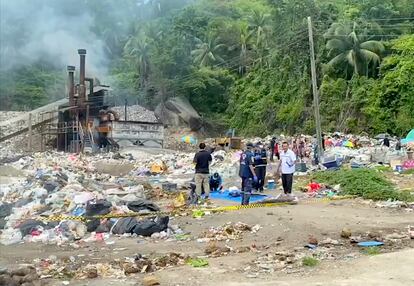Daniel Sancho: What happens next in Thailand murder and dismemberment case?
The Spaniard, accused of killing Colombian plastic surgeon Edwin Arrieta, could serve a sentence in Spain under a 1987 agreement if he is not given the death penalty

Spanish chef Daniel Sancho, the son of actor Rodolfo Sancho, who has confessed to the murder and dismemberment of Colombian plastic surgeon Edwin Arrieta on the Thai island of Koh Pha-ngan, was remanded in custody Monday by order of the Koh Samui Provincial Court. His possible cooperation in the investigation, the sentence that may be handed down if he is found guilty and the 1987 agreement signed between Madrid and Bangkok regarding “cooperation in the carrying out of criminal sentences” will decide the outcome of a complex and lengthy process Sancho’s defense hopes will conclude with his transfer to Spain to serve any possible sentence.
What punishment could Sancho face if convicted?
If the authorities consider it proven that the Spanish chef murdered the Colombian doctor, both the circumstances of the crime — in this case the dismemberment of the body and his attempt to conceal it in various locations on the island, and his cooperation with the investigation, to which several sources state he has confessed, in locating Arrieta’s remains — may serve to both aggravate or mitigate the sentence that could be imposed if he is found guilty. Under Thai law, murder and manslaughter carry three types of sentences, depending precisely on these circumstances. The most severe is the death sentence, although a life sentence or up to 20 years imprisonment are also possible.
If sentenced to death, what is the likelihood the punishment will be carried out?
While it is not uncommon for Thai courts to impose capital punishment, in most cases it is commuted to life imprisonment. According to sources familiar with the country’s judicial system, capital punishment is only applied in cases where the victims are members of the security forces or high-ranking government officials, and there are no known recent instances of a foreign national being executed. It is customary for King Maha Vajiralongkorn to take advantage of special dates, such as his birthday, to apply such pardons, as was the case in 2020 when another Spanish citizen, Artur Segarra, sentenced to death in 2017 for murdering and dismembering businessman David Bernat in Bangkok, had his sentence commuted to life imprisonment.

What if he is sentenced to life imprisonment?
If the sentence imposed is life imprisonment — either decided by the court or following the king’s prerogative to reduce a death sentence, a process that can take years — it will still provide an obstacle to Sancho’s possible transfer to Spain. Although the 1987 agreement between the two countries includes the possibility of repatriation, practice has shown that a life sentence complicates the process and makes it advisable instead to seek “a specific date” for finalization. This was the case with María Nieves García Alcaraz, a Spaniard sentenced to life imprisonment in 2010 after Thai police found 3.1 kilograms of crystal methamphetamine in her luggage. García Alcaraz pleaded guilty to avoid capital punishment, which is provided for under Thai law in certain drug-trafficking cases. However, she had to wait until King Maha Vajiralongkorn reduced her sentence to 25 years in order to complete the procedures for her transfer to Spain, which came in 2019.
What assistance do Spanish inmates receive abroad?
Spain provides citizens incarcerated overseas with consular assistance. Diplomatic sources explain that in addition to providing inmates with an amount not exceeding €120 per month if their families are unable to help them, consulate staff visit prisoners periodically to check their situation and facilitate contact with their relatives, in addition to providing information about lawyers in the country who can handle their case. They also ensure any medication they might need and attend trials in cases where it is suspected there will be no procedural guarantees. They also assist in applying for a transfer to serve a sentence in Spain, which many prisoners attempt to achieve, although not all of them are successful.
How is the transfer of a Spanish prisoner abroad managed?
There are two formulas. If the Spanish citizen is imprisoned in an EU country, the procedure is agile because as of 2014 it is carried out without the involvement of the Ministry of Justice and needs only the approval of a judge. The second concerns non-EU states and depends on the existence of a bilateral or multilateral agreement between the two countries concerned. Spain has agreements with 34 nations, including Thailand, as well as with the 67 members states of the Council of Europe. The 1987 agreement with Bangkok only vetoes the transfer of a prisoner when the crime committed is considered to have affected “internal or external security,” was directed against the “head of state or members of his family” or was related to the “smuggling of antiquities or treasures of national artistic heritage.” The formalities must be carried out through diplomatic channels and take into account that serving a sentence in the country of origin “may contribute to social reintegration.” The cost of the transfer is borne by the country of destination.




Can a sentence be modified once a prisoner returns to Spain?
The bilateral agreement with Thailand expressly states that the sentence “will be carried out according to the laws and regulations of the receiving state,” in this case Spain. If there is a disproportion (more than double) between the sentence imposed overseas and the maximum term for the same crime in Spain, Spanish legislation allows for the punishment to be reduced to the latter. This was the case with Nieves García, who was sentenced to life imprisonment in Thailand for a crime that in Spain is punishable by up to eight years. Furthermore, Thailand reserves “the right to pardon the offender or commute the sentence.”
Under what conditions will Sancho be detained in Thailand?
As Koh Pha-ngan does not have a prison, the Thai authorities have transferred him to a jail on the neighboring island of Koh Samui. However, he is likely to be moved to Bangkok so that he can be more easily assisted by the Spanish consular authorities. Bang Kwang prison in the Thai capital is where most foreign nationals with convictions or charges pending trial are held. The British writer Sandra Gregory, who was sentenced to death for drug trafficking and later had her sentence commuted to 25 years, ironically named the prison the “Bangkok Hilton” in her book narrating her time there. Sources familiar with conditions in Bang Kwang describe them as “very tough.” It is overcrowded: inmates have to sleep on the floor in collective cells and they are only allowed outside to the courtyards for short periods. Food is also scarce, although the prison authorities allow family members to provide this during visits. The heat, humidity and unfamiliarity with the Thai language are other difficulties for foreign prisoners.
Are there more Spanish prisoners in Thailand?
According to data from the Ministry of Foreign Affairs, as of August 1 there were 907 Spaniards held in foreign prisons. Of these, four were in Thailand, all of them in Bangkok, to which Sancho will now likely be added. Two are imprisoned for the crime of murder, among them Segarra. The third was jailed for robbery, while the fourth did not commit a crime in Thailand but was arrested by the authorities in Bangkok at the request of the Spanish justice system so that he could be extradited.
Sign up for our weekly newsletter to get more English-language news coverage from EL PAÍS USA Edition
Tu suscripción se está usando en otro dispositivo
¿Quieres añadir otro usuario a tu suscripción?
Si continúas leyendo en este dispositivo, no se podrá leer en el otro.
FlechaTu suscripción se está usando en otro dispositivo y solo puedes acceder a EL PAÍS desde un dispositivo a la vez.
Si quieres compartir tu cuenta, cambia tu suscripción a la modalidad Premium, así podrás añadir otro usuario. Cada uno accederá con su propia cuenta de email, lo que os permitirá personalizar vuestra experiencia en EL PAÍS.
¿Tienes una suscripción de empresa? Accede aquí para contratar más cuentas.
En el caso de no saber quién está usando tu cuenta, te recomendamos cambiar tu contraseña aquí.
Si decides continuar compartiendo tu cuenta, este mensaje se mostrará en tu dispositivo y en el de la otra persona que está usando tu cuenta de forma indefinida, afectando a tu experiencia de lectura. Puedes consultar aquí los términos y condiciones de la suscripción digital.








































